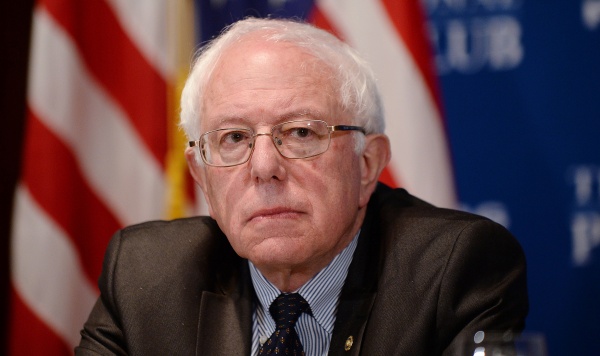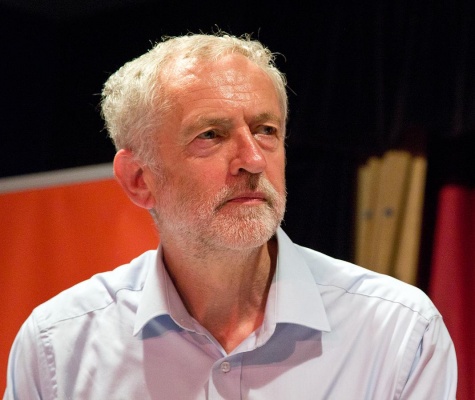Socialism is Not as Evil as We May Think
Jeremy Corbyn campaigning in Margate on September 5th 2015. The growing popularity of Bernie Sanders in the U.S. and the rise of Jeremy Corbyn as leader of the opposition in the UK indicates a shift in public opinion away from a strictly capitalist economy. (PHOTO COURTESY OF CHRIS BECKETT VIA FLICKR)
October 6, 2015
Three months ago, Jeremy Corbyn was almost denied entry into the leadership election of the British Labour Party due to not obtaining enough support from established members of Parliament. But on Saturday, Sept. 12, he took the stage as its chief executive. While the British media constantly reminds the citizenry that this man is a ”dangerous socialist,” Corbyn has quickly gone from a little-known “extremist” backbencher to the immensely popular public face of one of the most famous political parties in world history. Similar events are brewing across the pond, as Bernie Sanders inches closer to dethroning long-time Democratic Party frontrunner Hillary Clinton from her place as the conservative leadership’s appointed nominee for President of the United States. Both Sanders and Corbyn self-identify as “socialists.” Despite the media’s frequent use of the term as a slur for any politician slightly to the left of Dick Cheney, the label seems to have only served to gain them support and interest, as opposed to sinking their political hopes by portraying them as out-of-touch radicals. In reality, neither are nearly as radical as portrayed by the media, but the rise of the two men holds great importance; it is a powerful weapon against efforts to de-legitimize socialism and its worthy goals. The fact of the matter is that the vast majority of citizens, both American and British, stand to benefit from a transition to socialism, and that so many people are once again attracted to the term is a shockingly good sign in an era where discussion of alternative economic systems is oft considered verboten.

The appeal of socialism is the fact that it seeks to create a society that exists beyond the capitalist system, in which all economic power and influence lies in the hands of the tiny percentage of wealthy individuals that make up the capitalist class. A socialist society does not mean a society in which government owns everything, or—contrary to popular belief—regulated capitalism and strong social safety nets. Socialism is instead a radically different society in which the factories, the large-scale corporate farms, and the downtown office-buildings are owned by the people: operated locally and democratically. This society would be reminiscent of that of the Paris Commune, a radically democratic administration of the city by the workers of Paris in which universal suffrage was granted. Socialism is not about increasing the
power of the state at all; it seeks to increase the power of the majority of the human race, who for too long have been forced to labor for years on end, creating value for their bosses, only ever seeing a tiny fraction of the wealth they have produced. Despite a century of being portrayed by reactionaries as the antithesis of democracy, it is in fact the necessary extension of democracy to the economy.
Socialism also seeks to destroy the systemic obstructions that unfairly keep certain groups downtrodden and oppressed. Socialist movements have a rich history of fighting for the rights of women and people of color not as an act of charity, but because every injustice committed against another human being is intolerable in a free society. Take the Mujeres Liberes, a collective of anarchist women who fought for women’s rights and self-determination in the Spanish Civil War. Not to mention the many material gains made for women by the Chavista government in Venezuela, including public pensions for domestic workers and a constitutional right to equal pay for equal work. Or take the Black Panthers, a radical grouping of black Marxists dedicated to eradicating the twin evils of capitalism and white supremacy. The motives behind these actions are simple: Socialism could never survive without being inseparably tied to feminism and racial equality, as it would be nonsensical to destroy the concept of unearned economic privilege without addressing privileges held on the basis of race and gender.
[quote_center]Socialism also seeks to destroy the systemic obstructions that unfairly keep certain groups downtrodden and oppressed.[/quote_center]
And an attack on privilege seems to be just what young Americans want right now. Sanders, a self-described “socialist,” has been thrust into the limelight as his presidential run gains steam against Hillary Clinton, the former secretary of state, shortening her lead to the single digits in some polls. He has denounced income inequality to vast crowds of cheering fans, crowds that—much like Corbyn’s—are predominantly filled with young faces. Indeed, he has gathered the largest crowds of any candidate in this election cycle, speaking to a stadium filled with 11,000 people in Phoenix. He followed this with rallies of 15,000 in Seattle and 28,000 each in Los Angeles and Portland, Ore.
Socialism is not the opponent of liberty, but rather its dearest ally in our modern world. Despite years of denunciation, the devoted following of Sanders and Corbyn exhibits rays of hope. Their popularity has much less to do with the men themselves than it does with the simple justice of the movements they represent. Sanders’ widespread support and Corbyn’s political victory point to a rebirth for the left, to a future where human beings can make their own destiny, and where all men and women have the ability to live their lives as they see fit—free of exploitation, intolerance and oppression.











Spektor • Oct 15, 2015 at 8:37 pm
The denunciation of socialism might have something to do with the literally millions of people dead by the hands of socialist adherents over the course of the 20th century. No, seriously, flowery language and hand-wringing about the downtrodden aside, you could take an introductory course in 20th century history just to dispose of the idea that anti-socialist creeds have to do with capitalist opposition rather than the fact that countless souls starved to death all across the world as the great socialism experiment went on. You’re not talking about socialism, you’re talking about Scandinavia, and there’s a whole list of reasons their democratic socialism functions the way it does that you haven’t even thought about mentioning.
Have you any understanding at all of British politics? Jeremy Corbyn and Bernie Sanders are not spun from the same cloth. Corbyn makes Sanders look like Gordon Gekko. His election to the leadership of Labor Party had less to do with “the rise of the left” and more with the fact that Labor allowed literally anyone who paid a few pounds to be eligible to vote, which led to Conservative voters cheerfully signing up to ensure Labor chose a man who was completely unelectable. Labor wrote their own death sentence with that decision, especially after the left’s comprehensive defeat in the national elections spelled it out very clearly that the public was tired of them and wanted more moderate politics. But no, then they’d have to move back to the New Left, and that would mean acknowledging Tony Blair was right about the party. Better to commit suicide.
You know how I know you’re not great at economics?